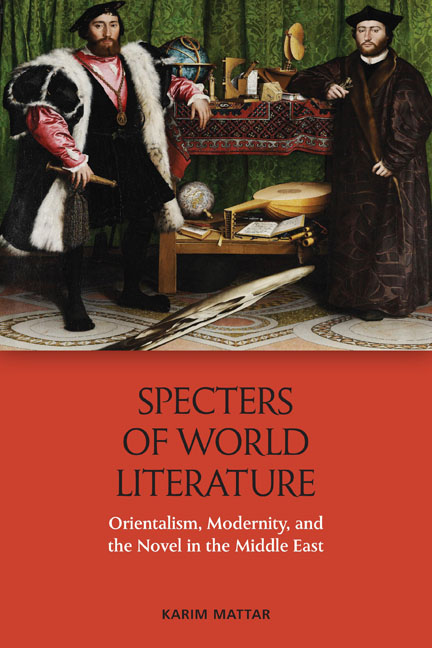Book contents
- Frontmatter
- Contents
- Preface
- Acknowledgments
- Note on Transliterations
- Introduction: Towards a Spectral Theory of World Literature
- I The Worlding of “Literature” in the Middle East
- II The Middle Eastern Novel and the Spectral Life-World of Modernity
- Conclusion: Futures of Spectrality
- Bibliography
- Index
3 - The Revolution of Form: Naguib Mahfouz from the Suez Crisis to the Arab Spring
Published online by Cambridge University Press: 20 October 2020
- Frontmatter
- Contents
- Preface
- Acknowledgments
- Note on Transliterations
- Introduction: Towards a Spectral Theory of World Literature
- I The Worlding of “Literature” in the Middle East
- II The Middle Eastern Novel and the Spectral Life-World of Modernity
- Conclusion: Futures of Spectrality
- Bibliography
- Index
Summary
Naguib Mahfouz […] has formed an Arabian narrative art that applies to all mankind.
“The Nobel Prize in Literature 1988,” NobelPrize.orgThe Naguib Mahfouz Medal for Literature is awarded for the best contemporary novel published in Arabic (but not yet in English) […] The award-winning book is subsequently translated and published in an Englishlanguage edition by the AUC Press in Cairo, New York, and London.
“The Naguib Mahfouz Medal for Literature,” The American University in Cairo PressNaguib Mahfouz”—the very name is saturated with signification. It refers to a local, Cairene writer, one whose literary career and imagination were as firmly anchored in the city of his birth as Charles Dickens's were in London and Honoré de Balzac's were in Paris. The Cairo Trilogy (Thalāthiyya al-Qāhira, 1956–7; trans. 1990–2), his most celebrated work, still stands as the most profound novelistic monument to this setting. It refers to a national, Egyptian writer, one who has become synonymous with the high literary culture of the country. Indeed, Egypt's most prestigious literary prize—the Naguib Mahfouz Medal for Literature—is named after him. It refers to a regional, Arabic writer, one who in the words of Roger Allen “is widely recognised as the founding father of the Arabic novel.” As Allen elsewhere writes, “his career marks the establishment of the genre as a centrally important player in the cultural life of the Arab world.” And it refers to a global writer, one whose award of the Nobel Prize in Literature in 1988—the first and thus far only for an Arab writer—had the effect of definitively consecrating the Arabic novel and modern Arabic literature more generally in what Pascale Casanova describes as the space of world literature.
At once signifying local, national, regional, and global literature, what are we to make of the apparent literary overdetermination of “Naguib Mahfouz”? What frame of reference or analytical methodology could possibly be adequate to a name that has been conscripted with equal enthusiasm into a number of distinct, even divergent literary and critical registers?
- Type
- Chapter
- Information
- Specters of World LiteratureOrientalism, Modernity, and the Novel in the Middle East, pp. 177 - 214Publisher: Edinburgh University PressPrint publication year: 2020



